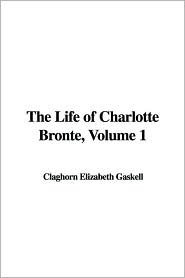You need to sign in or sign up before continuing.
Take a photo of a barcode or cover
emotional
informative
reflective
slow-paced
I read this as an audiobook. I don't remember much of it, this reminded me how much I hate audiobooks.
I own a greeting card that depicts three happy, smiling young ladies who appear to be thinking slyly, all with brown eyes and middle-parted hair. The words "Bronte Sisters" are lettered into the pastel rose background of the card, and I have mounted it on the wall above this very computer where I pen--er, type--these lines to you. They smile down, but never make eye contact.
Yet I must report that, according to this biography of Charlotte by Mrs. Elizabeth Gaskell, my card and its merriness? Lies. For the Brontes in this book are ill-mooded, always coughing, often beleaguered with aching heads and low fevers and an incredible propensity to avoid personal contact with others unless absolutely necessary, and then only when they are so starved for company or wanting to bestow benevolence on villagers worse off than they are.
They live at the foot of an old musty graveyard where tainted rain runs down to their house and causes them all unending misery, from both health and psychological perspectives. Mrs. Gaskell paints Charlotte as so righteous and self-sacrificing that no doubt her friends might have rolled their eyes as she protested their praise, scolded them for suggesting she and her kin were novelists, and in general, was insistently morose, if not brilliant.
I am hesitant to give this books a judgment of stars. Gaskell is a wonderful writer, but she elides so many details of what might make these sisters more than saints, more than martyrs, more than scolds. So I will withhold my praise or dismay, and leave you with the declaration that I might be willing to give Wuthering Heights a second chance, knowing now that malnourished, stubbornly pious, and grieving sisters were at the wild story's root.
Yet I must report that, according to this biography of Charlotte by Mrs. Elizabeth Gaskell, my card and its merriness? Lies. For the Brontes in this book are ill-mooded, always coughing, often beleaguered with aching heads and low fevers and an incredible propensity to avoid personal contact with others unless absolutely necessary, and then only when they are so starved for company or wanting to bestow benevolence on villagers worse off than they are.
They live at the foot of an old musty graveyard where tainted rain runs down to their house and causes them all unending misery, from both health and psychological perspectives. Mrs. Gaskell paints Charlotte as so righteous and self-sacrificing that no doubt her friends might have rolled their eyes as she protested their praise, scolded them for suggesting she and her kin were novelists, and in general, was insistently morose, if not brilliant.
I am hesitant to give this books a judgment of stars. Gaskell is a wonderful writer, but she elides so many details of what might make these sisters more than saints, more than martyrs, more than scolds. So I will withhold my praise or dismay, and leave you with the declaration that I might be willing to give Wuthering Heights a second chance, knowing now that malnourished, stubbornly pious, and grieving sisters were at the wild story's root.
This book's existence is nothing less than a complete privilege.
Elizabeth Gaskell, a renowned writer of the Victorian age herself, handled her subject with tenderness and reverence. She became friends with Charlotte Brontë years after the premature deaths of Branwell, Emily, and Anne Brontë. This was an interesting time to make acquaintance with the authoress; her days involved caring for her father, keeping the household and parsonage in order, working on novels, and engaging in consistent battles with her own mind, which was so (understandably) prone to fall into the clutches of grief and depression.
The book is filled with beautifully attentive descriptions of Haworth and the surrounding country and is also rich in history. Gaskell writes with an ease of affection, probably afforded to her by her still very recent mourning of her dear friend. Charlotte was a close friend to Gaskell's own children; the latter's youngest daughter shared a special connection, always reaching for Charlotte's hand and simply holding it throughout their visits.
As a literary biography, the Brontës are done great justice in terms of who they were within their art. The piercingly poignant anecdotes of the slow and sickly deaths of Emily and Anne are haunting and moving at the very least. The memory of which, always stayed with Charlotte until the day of her own departure. It is easily detectable in the letters and prose of her later years, and close friends could see it in her very eyes. Yet, being who she so naturally was, Charlotte still ascertained that she had much to be thankful for, and consistently pulled herself up out of despair by simply proclaiming "It is well." Her faith and focus on all that is above rather than all that is below and temporal, is a true cause for reverence. I am inspired to occupy a similar state of mind and spirit as she did.
There is some (I think) unjustified criticism looming around this work, largely regarding the alleged bias Gaskell held in writing about her friend. It's true, she skimmed over particulars of Brontë's life, occurrences that she was sure her friend was not proud of and definitely not quick to recall. This choice appears to me only as a genuine and dutiful favor from one friend to another. This is not naivety. We are all human. I don’t doubt for a second that Gaskell omitted certain traits or events that would paint her friend in an unfavorable light. This is a biography, yes, but it is also clearly a tribute from a bereaved friend. I am, frankly, not one to feel robbed by the lack of any negative details; I imagine I'd actually feel that way if Gaskell had opted to write a totally real yet horribly cold portrait. I read this book because I wanted to be better acquainted with the depths of warmth, constancy, and severity of knowing Charlotte Brontë as a woman, not Currer Bell as a distant novelist who may have made many errors. That sort of wall should not be constructed in biography.
I often feel repelled by the realm of criticism, whose true aim seems to always involve picking a person apart – stripping them down to nothing more than a body who in one breath writes a masterpiece of humanity and in the next commits mortal sins that cannot be reconciled by the former.
I am very grateful for this book, as strongly as I am for whom it is written.
"But I turn from the critical, unsympathetic public, - inclined to judge harshly because they have only seen superficially and not thought deeply. I appeal to that larger and more solemn public, who know how to look with tender humility at faults and errors; how to admire generously extraordinary genius, and how to reverence with warm, full hearts all noble virtue. To that Public I commit the memory of Charlotte Brontë."
Elizabeth Gaskell, a renowned writer of the Victorian age herself, handled her subject with tenderness and reverence. She became friends with Charlotte Brontë years after the premature deaths of Branwell, Emily, and Anne Brontë. This was an interesting time to make acquaintance with the authoress; her days involved caring for her father, keeping the household and parsonage in order, working on novels, and engaging in consistent battles with her own mind, which was so (understandably) prone to fall into the clutches of grief and depression.
The book is filled with beautifully attentive descriptions of Haworth and the surrounding country and is also rich in history. Gaskell writes with an ease of affection, probably afforded to her by her still very recent mourning of her dear friend. Charlotte was a close friend to Gaskell's own children; the latter's youngest daughter shared a special connection, always reaching for Charlotte's hand and simply holding it throughout their visits.
As a literary biography, the Brontës are done great justice in terms of who they were within their art. The piercingly poignant anecdotes of the slow and sickly deaths of Emily and Anne are haunting and moving at the very least. The memory of which, always stayed with Charlotte until the day of her own departure. It is easily detectable in the letters and prose of her later years, and close friends could see it in her very eyes. Yet, being who she so naturally was, Charlotte still ascertained that she had much to be thankful for, and consistently pulled herself up out of despair by simply proclaiming "It is well." Her faith and focus on all that is above rather than all that is below and temporal, is a true cause for reverence. I am inspired to occupy a similar state of mind and spirit as she did.
There is some (I think) unjustified criticism looming around this work, largely regarding the alleged bias Gaskell held in writing about her friend. It's true, she skimmed over particulars of Brontë's life, occurrences that she was sure her friend was not proud of and definitely not quick to recall. This choice appears to me only as a genuine and dutiful favor from one friend to another. This is not naivety. We are all human. I don’t doubt for a second that Gaskell omitted certain traits or events that would paint her friend in an unfavorable light. This is a biography, yes, but it is also clearly a tribute from a bereaved friend. I am, frankly, not one to feel robbed by the lack of any negative details; I imagine I'd actually feel that way if Gaskell had opted to write a totally real yet horribly cold portrait. I read this book because I wanted to be better acquainted with the depths of warmth, constancy, and severity of knowing Charlotte Brontë as a woman, not Currer Bell as a distant novelist who may have made many errors. That sort of wall should not be constructed in biography.
I often feel repelled by the realm of criticism, whose true aim seems to always involve picking a person apart – stripping them down to nothing more than a body who in one breath writes a masterpiece of humanity and in the next commits mortal sins that cannot be reconciled by the former.
I am very grateful for this book, as strongly as I am for whom it is written.
"But I turn from the critical, unsympathetic public, - inclined to judge harshly because they have only seen superficially and not thought deeply. I appeal to that larger and more solemn public, who know how to look with tender humility at faults and errors; how to admire generously extraordinary genius, and how to reverence with warm, full hearts all noble virtue. To that Public I commit the memory of Charlotte Brontë."
challenging
reflective
sad
slow-paced
I thoroughly enjoyed reading all of Charlotte's letters. It's kind of depressing that letter writing is dead. This is a must read for anyone who loved Jane Eyre or any other Brontë novel.
3.5 stars
this was a very interesting book. i don't know a lot about the brontës and at this moment in time i have read very little of their work (the only books i've read are charlotte brontë's jane eyre and villette) so this biography by gaskell, although highly subjective, was the perfect place to gain some more information about charlotte brontë and her family. it was gripping, easy to read and at times it made me feel very emotional + i also loved reading charlotte's letters, for me they were the highlight of the book!
this was a very interesting book. i don't know a lot about the brontës and at this moment in time i have read very little of their work (the only books i've read are charlotte brontë's jane eyre and villette) so this biography by gaskell, although highly subjective, was the perfect place to gain some more information about charlotte brontë and her family. it was gripping, easy to read and at times it made me feel very emotional + i also loved reading charlotte's letters, for me they were the highlight of the book!
Listened to this on Librivox and am now motivated to get the book so I can re-read it in print form.
Charlotte Bronte was truly an extraordinary individual. This biography written by her friend Elizabeth Gaskell is a powerful history of the tragic life the Bronte sisters led. Their strong personalities and steady faith drew them closer together, and provided the genius for their incredible writing.
I loved reading about the eccentric Bronte family, and the close relationships between the siblings. Their isolated home among the moors of Yorkshire inspired similar vigorous settings for many of their books. It was interesting to see how their personal experiences led to fictional creations like the terrible Lowood School in 'Jane Eyre' or the awful governess situation in 'Agnes Grey'. There are many parallels from their real lives to their writing.
The writing is really gripping and easy to read, and I loved that so much of the text is excerpts from Charlotte's own letters. I especially like this edition with the extensive notes and appendices that elaborate on more of the history, and also explain Mrs. Gaskell's decisions to leave out certain aspects of the Bronte's lives to protect other people's privacy.
I cried several times while reading this book, especially at the tragic death scenes. It really is emotional to read about such a close and fierce love between the Bronte sisters, and then when Emily and Anne die within a few months of each other, and Charlotte is left all alone... it's depressing to read about. That's just how powerful the writing is, and how compelling these characters from history were.
I loved all the little details about their everyday lives, their servants, their home, their father's religious work in the parish, and their habit of walking on the moors. They had such mighty brains and energetic thoughts, but were trapped in weak bodies that were often ill. Their personalities in public were shy and retiring, and yet their inner lives were so colorful and dynamic.
This book has helped me to dive a little deeper into the people behind the books, and I will never read their writing quite the same way again now that I know the authors a little better.
I loved reading about the eccentric Bronte family, and the close relationships between the siblings. Their isolated home among the moors of Yorkshire inspired similar vigorous settings for many of their books. It was interesting to see how their personal experiences led to fictional creations like the terrible Lowood School in 'Jane Eyre' or the awful governess situation in 'Agnes Grey'. There are many parallels from their real lives to their writing.
The writing is really gripping and easy to read, and I loved that so much of the text is excerpts from Charlotte's own letters. I especially like this edition with the extensive notes and appendices that elaborate on more of the history, and also explain Mrs. Gaskell's decisions to leave out certain aspects of the Bronte's lives to protect other people's privacy.
I cried several times while reading this book, especially at the tragic death scenes. It really is emotional to read about such a close and fierce love between the Bronte sisters, and then when Emily and Anne die within a few months of each other, and Charlotte is left all alone... it's depressing to read about. That's just how powerful the writing is, and how compelling these characters from history were.
I loved all the little details about their everyday lives, their servants, their home, their father's religious work in the parish, and their habit of walking on the moors. They had such mighty brains and energetic thoughts, but were trapped in weak bodies that were often ill. Their personalities in public were shy and retiring, and yet their inner lives were so colorful and dynamic.
This book has helped me to dive a little deeper into the people behind the books, and I will never read their writing quite the same way again now that I know the authors a little better.
informative
reflective
The Victorian biography is very different to the modern one. This mainly contained commentary based on Charlotte's letters, which were quoted greatly. A lot of information was twisted and left out to fit Gaskell's narrative and portrayal of Charlotte. For the Brontë fans, it is a recommended read but should be read critically.







